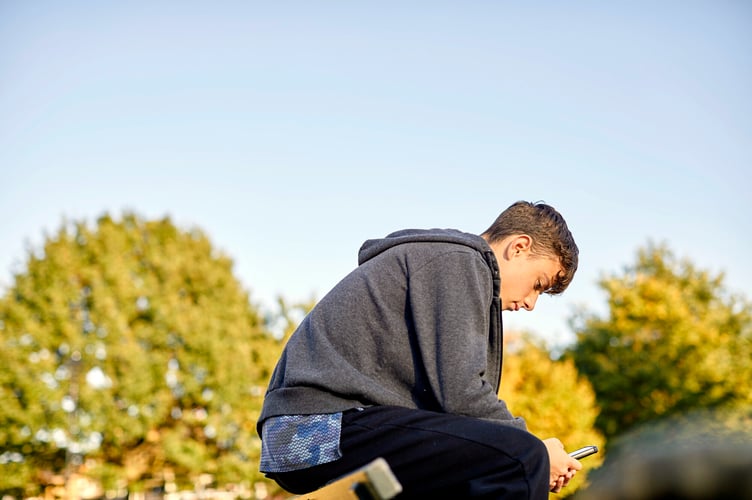2,844 online grooming crimes have been recorded by police in the South West in the six years that children have been waiting for online safety laws, new figures published by the NSPCC reveal today.
Data from police forces in the South West show that 562 Sexual Communication with a Child offences were recorded last year – a 17% increase on 2021/22 and the highest on record.
The highest annual increase in recorded offences in the South West was in Wiltshire where the number of sexual communication with a child offences jumped by 112%.
Elsewhere in the South West Gloucestershire recorded a 53% rise; Dorset a 34% increase; in Avon and Somerset there was a 12% rise; whilst in Devon and Cornwall there was a reduction of 27%. (See notes below for full data).
The new research shows that across the UK more than 5,500 offences took place against primary school children, with under-12s making up a quarter of known victims.
The new analysis of the scale and nature of child sexual abuse taking place on social media comes ahead of MPs and Lords making final decisions on the Online Safety Bill next month.
The NSPCC first called for social media regulation to protect children from sexual abuse in 2017 and has been campaigning for robust legislation ever since.
They said the number of offences and victims is likely to be far higher than those known to police. In response, they are urging politicians on all sides to support the Bill in its final stages and pass this vital legislation.
The UK-wide figures also reveal:
- The stark reality of sexual violence faced by girls on social media, with four in five (83%) of grooming cases over the six years taking place against girls, where the gender was known.
- Snapchat was used in more than a quarter (26%) of total instances over the six years, while Meta-owned products were used in almost half (47%), where the means of communication was known.
- 150 different apps, games and websites were used to target children according to the police data analysed since 2017/18.
Sohphia groomed by man
Sophia* was 15 she was groomed by a man posing as a boy who she was chatting to on social media.
Sophia, now aged 19, said: 'He started getting angry if I didn’t reply quick enough or when I wasn’t saying exactly what he wanted to hear. It felt strange, how he was being, so I tried breaking off the conversation with him on Yubo. He just found me on Instagram and moved to messaging me directly there.
'He had started asking for selfies of me, then asking me to take my clothes off and send photos. When he threatened me and started being angry, I was petrified. He used the images to control me. I wasn’t even allowed to use the toilet without his permission. I was afraid to tell anyone because of the photos and his threats. He threatened to share the images of me with friends and family he’d found through my social media if I stopped replying.'
A draft Online Safety Bill was published over two years ago but regulation was first promised by Government in 2018 following the NSPCC’s call for action and the launch of its Wild West Web campaign.
The charity has been campaigning for strong legislation ever since, working closely with survivors, Government, Parliamentarians, and other civil society groups to ensure it effectively tackles the way social media and gaming sites contribute to child sexual abuse.
The legislation will mean tech companies have a legal duty of care for young users and must assess their products for child abuse risks and put mitigations in place to protect children.
It will give the regulator Ofcom powers to address significant abuse taking place in private messaging and require companies to put safeguards in place to identify and disrupt abuse in end-to-end encrypted environments.
The NSPCC said these measures are vital to effectively protect children from the most insidious abuse and recent polling shows they are backed by more than seven in ten voters.
Sir Peter Wanless, NSPCC Chief Executive said: 'Today’s research highlights the sheer scale of child abuse happening on social media and the human cost of fundamentally unsafe products.
'The number of offences must serve as a reminder of why the Online Safety Bill is so important and why the ground-breaking protections it will give children are desperately needed.
'We’re pleased the Government has listened and strengthened the legislation so companies must tackle how their sites contribute to child sexual abuse in a tough but proportionate way, including in private messaging.
'It’s now up to tech firms, including those highlighted by these stark figures today, to make sure their current sites and future services do not put children at unacceptable risk of abuse.”'
As well as winning the commitment to legislate, the NSPCC has helped shape significant gains for children in the Online Safety Bill as it has passed through Parliament, including:
- Senior tech bosses will be held criminally liable for significant failures that put children at risk of sexual abuse and other harm.
- Girls will be given specific protections as Ofcom will produce guidance on tackling Violence Against Women and Girls for companies to follow.
- Companies will have to crack down on so-called tribute pages and breadcrumbing that use legal but often stolen images of children and child accounts to form networks of offenders to facilitate child sexual abuse.
- Sites will have to consider how grooming pathways travel across various social media apps and games and work together to prevent abuse spreading across different platforms.
The NSPCC is still seeking assurances that the legislation will effectively regulate AI and immersive technology and wants an online child safety advocacy body specifically to speak with and for children as part of the day-to-day regulatory regime. They argue that this will help spot emerging risks and fight for the interests and safety of children before tragedies arise.
The charity are asking campaigners to reach out to MPs with personal messages about why they should act to make the online world safer for children and pass a robust Online Safety Bill in the coming weeks.
It must be noted that the figures for Devon & Cornwall Police for 2022/23 (85) only cover the period April 1, 2022 to November 14, 2022 and so do not represent a full year.
*Name has been changed to protect identity.

Online Safety Bill Timeline:
2014 NSPCC launches a campaign calling for a new offence to make online grooming a crime, by making it illegal for an adult to send a child a sexual message. 50,000 people signed our petition
2015 The Government included the offence in the Sexual Offences Act 2015, but it took two more years of sustained campaigning before they finally brought the offence into force so police could take action and arrest offenders
April 2017 Sexual Communication with a Child became an offence
April 2017 The NSPCC first called on Government to bring in statutory regulation of social networks
Dec 2017 NSPCC call for tech companies to have a legal duty of care to keep children safe
April 2018 Launch of NSPCC’s Wild West Web campaign
June 2018 Following an NSPCC campaign, then Culture Secretary Matt Hancock commits to legislate to protect children
Feb 2019 Taming the Wild West Web was published outlining a plan for regulation
April 2019 Government publishes the Online Harms White Paper
January 2020 Online Harms paving bill, prepared by the Carnegie Trust and introduced by Lord McNally, was selected for its first reading in the Lords
February 2020 Government publish initial consultation to the Online Harms White Paper, announcing Ofcom as the likely watchdog
September 2020 NSPCC sets out six tests for the Online Harms Bill in its Regulatory Framework
December 2020 Government published its Online Harms White Paper consultation response
March 2021 NSPCC analysis of the consultation response found significant improvement is needed in a third of areas of proposed legislation if the Online Safety Bill is to extensively protect children from avoidable harm and abuse
May 2021 Government publishes draft Online Safety Bill
September 2021 Parliamentary scrutiny begins, and the NSPCC publish Duty to Protect - An assessment of the draft Online Safety Bill against the NSPCC’s six tests for protecting children
October 2021 Facebook whistleblower Frances Haugen gives evidence to the Joint Committee on the Draft Online Safety Bill
December 2021 The joint committee on the Draft Online Safety Bill call for a number of changes to the legislation to better prevent child abuse
January 2022 DCMS Committee back NSPCC’s call for the Online Safety Bill to put a legal duty on tech firms to disrupt the way offenders game social media design features to organise around material that facilitates abuse
January 2022 The Petitions Committee also called for the Online Safety Bill to be strengthened
March 2022 NSPCC urge Government to listen to the overwhelming consensus of Parliamentarians, civil society and the UK public to close significant gaps in the way Online Safety Bill responds to grooming
March 2022 The Government publishes the Online Safety Bill
April 2022 Online Safety Bill has its Second Reading and NSPCC publish its Time to Act report which sets out where the Bill can be improved to become a world-leading response to the online child abuse threat
May 2022 Online Safety Bill Committee Stage begins
July 2022 Online Safety Bill Report Stage debates
Summer 2022 Online Safety Bill delayed by two changes to Prime Minister
September 2022 Inquest into the death of 14-year-old Molly Russell finds social media contributed to her death
December 2022 Online Safety Bill returns to Parliament
December 2022 Bereaved Families for Online Safety formed to campaign for strong protections for children and families through the Online Safety Bill
January 2023 Conservative MP rebellion backs NSPCC amendment that forces Government to commit to holding senior tech managers liable for harm to children
January 2023 Online Safety Bill begins its journey through the House of Lords
Spring 2023 Government amendments strengthen protections for children following campaigning by civil society, including NSPCC and Bereaved Families for Online Safety
September 2023 Online Safety Bill due its Third Reading in the House of Lords and to return to Parliament for final passage
The NSPCC is here to help you - visit https://www.nspcc.org.uk/





Comments
This article has no comments yet. Be the first to leave a comment.